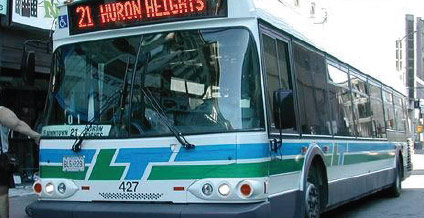The Conscious Campus: Travel options for Fanshawe students
 CREDIT: FILE PHOTO
CREDIT: FILE PHOTORiding the bus is one way Fanshawe students can help the environment.
How do you get to class? When it comes to transportation, there are many different options including driving your own car, carpooling, taking the bus, cycling and walking.
For those of us who have our own cars, we also have the pleasure of paying for the gas, insurance and parking. In addition to those costs, cars also represent a significant cost to our environment throughout their entire life, including their manufacture, use and final disposal. Resources like steel, rubber, glass, plastics, paints and many more must be mined, refined, manufactured and installed before the car is even in your driveway. In much the same way, when you are done with your car, the car is not done with the environment. Things like plastics, toxic battery acids, oils and other products persist in the environment for a long time. On a more positive note, nationalgeographic.com reports that “junkyard pile-ups are becoming much smaller than they were in the past. About three-quarters of today's average car, including the bulk of a steel frame, can be recycled.”
While these impacts are significant, they are relatively minor in comparison to those incurred throughout your car's lifetime via fuel consumption and emissions. According to nationalgeographic.com, “Fuel consumption and emissions account for 80 to 90 per cent of an automobile's environmental impact.” First the fuel must be extracted, and then it has to be transported. Both of these activities use a lot of energy, can damage ecosystems and cause environmental catastrophes, such as oil spills. Finally, as fuel is being used in your car, carbon dioxide emissions coming from the exhaust are a major contributor to global warming and climate change. The Canadian government's Action on Climate Change page (ClimateChange.gc.ca) reports that “the burning of fossil fuels — primarily coal, oil, and natural gas — accounts for between 70 and 90 per cent of all human emissions of carbon dioxide, which is a major greenhouse gas.”
So it would seem that the cost of driving a car to class is hard on both our wallets and the environment. For some, driving a car to school is their only option, but those with more flexibility may find other transportation alternatives a lot easier to deal with.
Fanshawe College and the Student Union encourage students to use the London Transit Commission by including a bus pass with tuition. This makes the cost of riding the bus more manageable throughout the year, and has resulted in high student ridership. In fact, a survey conducted by the LTC a couple of years ago found that 50 per cent of full-time students rode the bus at least five times each week — this is something we can all be proud of! Each person on the bus is one less car on the road, which means less greenhouse gas emissions and fuel consumption. In fact, according to an article in the BC Medical Journal, “Opting for public transit just two days out of five will cut personal GHG emissions by 25 per cent.” Additionally, many communities have found that having a good transit system promotes healthy communities and reduces stress.
Cycling and walking during the winter months may be difficult, but at other times during the year, it becomes a much more convenient and beneficial travel option. Other than the initial investment into a bike or good walking shoes, cycling and walking costs nothing on a day to day basis, and has no direct CO2 emissions. The health benefits of biking and walking have also been widely documented and include weight loss, improved cardiovascular health and reduced stress. At Fanshawe College, there are bike racks located throughout the campus, including a controlled-access, fenced-in compound to provide a more secure option for those cyclists who have invested considerably more money into their bicycles. After your bike or walk in, students can access the lockers and showers in the J Building team rooms to freshen up.
Carpooling is another travel choice that is both cost effective and good for the environment. By carpooling, you can share your car's fuel and maintenance costs with other people, cutting your costs of driving by 50 per cent or more... the more people who carpool, the more money you save. Each person who carpools means one less car on the road, which both reduces greenhouse gas emissions and improves air quality — a “win-win” for the environment and our health. How do you find people to carpool with? Fanshawe College offers its students free access to an online matching system called Carpool Zone, where in just a few easy steps you can find other student carpoolers to share a ride to and from the college. To get instructions on how to access this site, please email sustainability@fanshawec.ca.
When it comes to finding ways to and from the college, the good news is, we are not short on options!
The Conscious Campus is a biweekly column examining sustainability at Fanshawe College, what that means and how you play a role in creating this, our conscious campus. Please contact sustainability@fanshawec.ca with any questions or comments













